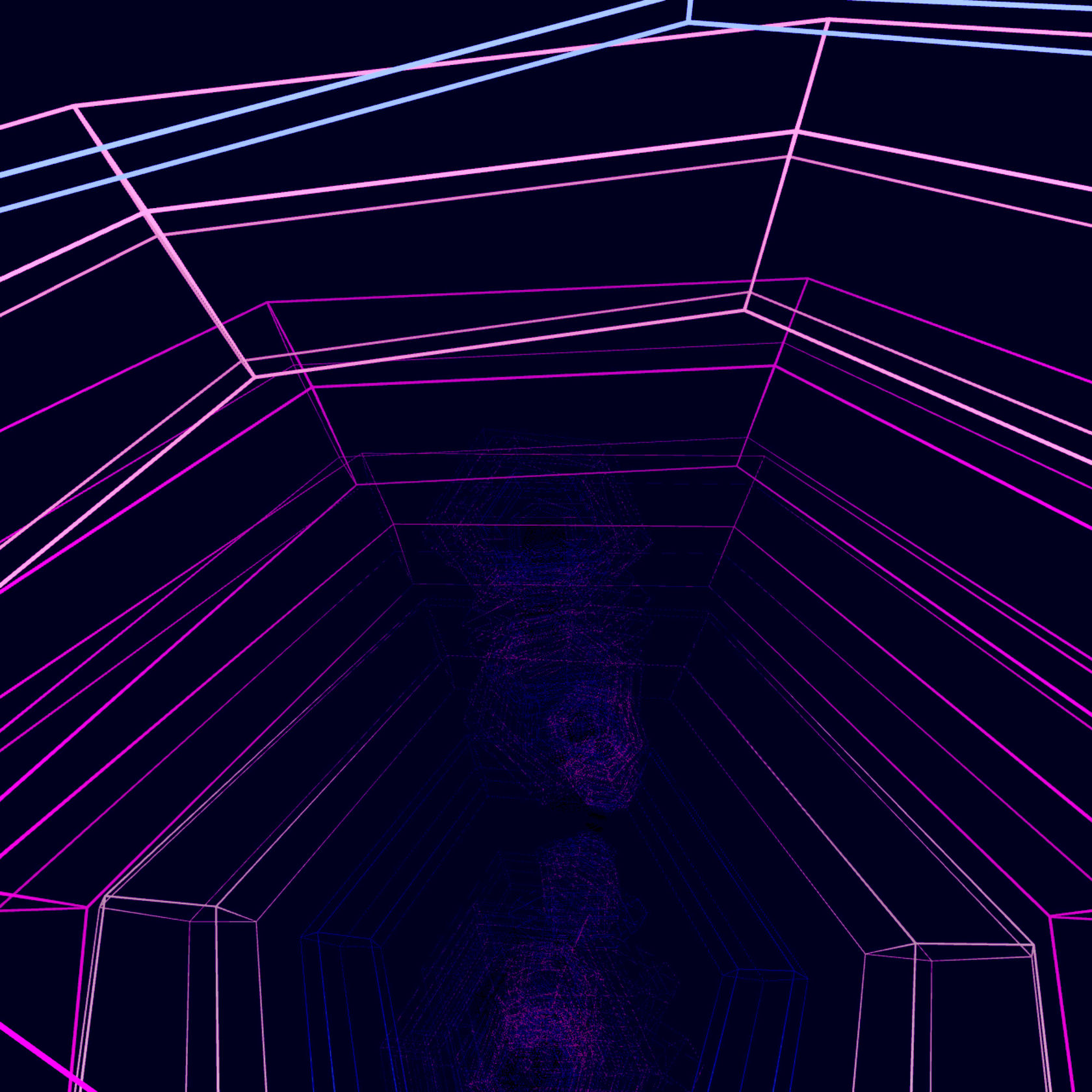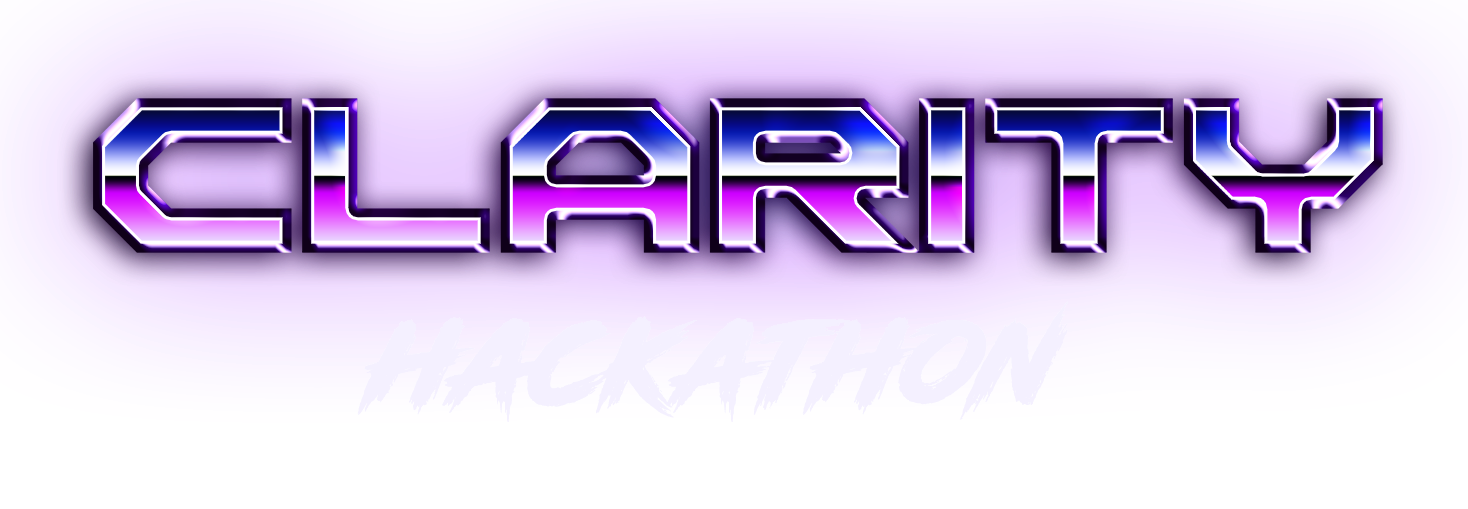
Blockstack's Clarity Hackathon
Blockstack's Clarity Hackathon is a virtual hackathon composed of two challenges. In the first, you'll build your very own smart contracts using Clarity. In the second you'll build tools that will make it easier for other developers working with Clarity.
Clarity is Blockstack's smart contract language designed from the ground up to reduce bugs and behave predictably. It provides native functions that make it easy for developers to create complex smart contracts while protecting users at every step. Clarity provides precise tools for enabling on-chain logic while reducing unintentional errors.
Clarity is Blockstack's smart contract language designed from the ground up to reduce bugs and behave predictably. It provides native functions that make it easy for developers to create complex smart contracts while protecting users at every step. Clarity provides precise tools for enabling on-chain logic while reducing unintentional errors.
Smart Contract Challenge
→ Meet the winners!
This Smart Contract Challenge lets you experiment and get familiar with Clarity's developer environment. Contracts are awarded based on the level of impact.
01
Clarity Tooling Challenge
June 3rd - June 30th, 2020
This challenge will reward you for building the most useful and valuable tools other developers can use with Clarity in the future. Clarity is a brand new language, so supporting ease and speed of development with things like visual coding tools, linters, and more will help the community and immensely.
This challenge will reward you for building the most useful and valuable tools other developers can use with Clarity in the future. Clarity is a brand new language, so supporting ease and speed of development with things like visual coding tools, linters, and more will help the community and immensely.
02
Prizes
1st Place
$3,000
+ Blockstack swag bag
2nd Place
$1,500
+ Blockstack swag bag
3rd Place
$500
+ Blockstack swag bag
Judges
Aaron Blankstein
Aaron Blankstein joined the Blockstack engineering team from an academic background, finishing his PhD in 2017 at Princeton. His doctoral research spanned a range of topics, mostly focusing on web application performance and security. He's worked in information flow tracking systems, caching algorithms, compilers, and applied cryptography. 10+ years of Emacs usage. @AaronBlankstein
Ludovic Galabru
"Ludo" is a Blockstack Engineering Partner, focusing his efforts on Blockstack core. Previously, he co-founded and built the engineering team at Purchease. He moved to NYC in 2017 to join Younow, leading the efforts on devops and blockchain engineering.
Ludo received his Masters in Computer Science from EFREI in Paris, France.
Ludo received his Masters in Computer Science from EFREI in Paris, France.
Vivek Singh
Vivek Singh is the COO of Gitcoin and Operations Lead at ConsenSys. @vsinghdothings
Jaye Harrill
Passionate communications manager for blockchain security company Quantstamp, Jaye has a long leadership history in blockchain and Ethereum community spaces. She has dedicated her life to bringing broad visibility to the transformative changes this technology is expected to bring. Currently, Jaye is most known for her marketing, community events and security standards work. She is committed to bridging as many blockchain newbies together with as many vets as possible. Long term, 1 doge will forever be 1 doge. @JayeHarrill
FAQ
Email [email protected] if you don't see an answer you need!
Am I eligible?
You must build and submit a new tool to be eligible. It will be at the discretion of PBC if it is suspected someone is trying to game the system by trying to make slight changes to existing tools for the reward. Lastly, participants need to be over 18 years of age and adhere to the hackathon rules.
What are the rules?
- All submitted tools must be open source. The source code should be openly published for modification and use.
- Tools must be publicly available on GitHub, Gitlab, or similar publicly accessible link. Tools must have basic testing and documentation to qualify.
- The contracts and tools must be built for Blockstack's Clarity smart contracting language.
- Tools must be submitted by EOD 6/30/20 to the corresponding Github issue to qualify.
- Good Will rule: it will be at the discretion of PBC if folks game the system by trying to make slight changes to an existing tool for the reward. Payments will be sent in BTC.
How do I enter?
- Create an account on Gitcoin (you likely already did this when you registered for the hackathon!). If you have any trouble, the Gitcoin Wiki is a fantastic overview of the platform and its features for coders.
- Make sure you've joined the Clarity Hackathon on Gitcoin.
- Navigate to the "Prizes" page
- Follow the instructions to submit your project via Gitcoin and Github.
Are there any other requirements for my submission?
Yes, All submitted tools must be open source. Tools source code must be publicly available on GitHub, Gitlab, or similar publicly accessible link. Once public, tools can then be submitted through the Gitcoin Hackathon Prize Explorer.
Requirements: Tools must have basic testing and documentation to qualify.
Requirements: Tools must have basic testing and documentation to qualify.
What kinds of tools can I submit?
While Part 1 was entirely focused on singular Clarity smart contracts, Part 2 is asking for Clarity tooling submissions.
Exploring any new blockchain platform can be challenging, which is why tooling is integral for onboarding builders and streamlining development.
Good news: There are all sorts of different tools! It's a broad term that loosely translates to: "Make developers and users lives easier". Some examples that might help:
Linters are tools that analyze source code to flag programming errors, bugs, stylistic errors, and suspicious constructs. They can also color-code different categories of text to help differentiate functionality, or even autocomplete common statements and commands.
Visual/interactive editors greatly simplify the development process, and reduce complexity for beginner programmers. "No-code" platforms, allowing you to simply drag-and-drop various elements into the code, have exploded recently and expand the audience of people with the potential to build applications.
Tooling can also be as simple as a comprehensive documentation page or substantial tutorial. An all-encompassing guide, with screenshots, code snippets or a video demo, can be just as helpful to the community as a piece of software or plugin.
The field is wide open! An IDE extension for language support? Code-coverage validator? A basic boilerplate project generator? If it solves a problem or alleviates a pain-point, it's probably a tool!
Use your imagination and if you have any doubt something you're thinking of is a good fit, ping us in Discord.
For a fantastic example, check out this tool developed recently by one of our rockstar community members. The "Stackulator" is a simple web app that allows users to calculate the potential amount of bitcoin someone could earn by locking up $STX tokens on the Stacks 2.0 Mainnet. It has a beautifully simple UI, "Simple" & "Advanced" modes for all levels of technical ability, and is focused on educating the ecosystem on the mechanism of "Stacking".
Exploring any new blockchain platform can be challenging, which is why tooling is integral for onboarding builders and streamlining development.
Good news: There are all sorts of different tools! It's a broad term that loosely translates to: "Make developers and users lives easier". Some examples that might help:
Linters are tools that analyze source code to flag programming errors, bugs, stylistic errors, and suspicious constructs. They can also color-code different categories of text to help differentiate functionality, or even autocomplete common statements and commands.
Visual/interactive editors greatly simplify the development process, and reduce complexity for beginner programmers. "No-code" platforms, allowing you to simply drag-and-drop various elements into the code, have exploded recently and expand the audience of people with the potential to build applications.
Tooling can also be as simple as a comprehensive documentation page or substantial tutorial. An all-encompassing guide, with screenshots, code snippets or a video demo, can be just as helpful to the community as a piece of software or plugin.
The field is wide open! An IDE extension for language support? Code-coverage validator? A basic boilerplate project generator? If it solves a problem or alleviates a pain-point, it's probably a tool!
Use your imagination and if you have any doubt something you're thinking of is a good fit, ping us in Discord.
For a fantastic example, check out this tool developed recently by one of our rockstar community members. The "Stackulator" is a simple web app that allows users to calculate the potential amount of bitcoin someone could earn by locking up $STX tokens on the Stacks 2.0 Mainnet. It has a beautifully simple UI, "Simple" & "Advanced" modes for all levels of technical ability, and is focused on educating the ecosystem on the mechanism of "Stacking".
What is the judging criteria?
Tooling submissions will be judged on the following aspects:
Submissions will receive a score from 1-5 on each of these aspects and scores will be combined for a final total score. The highest total score will place 1st, the second-highest score will place 2nd, and so on.
- Design: Is the tooling code well-structured and broken in logical segments?
- Functionality: How powerful or robust is the functionality the tool provides?
- Use of Clarity Reference: How many different Clarity functions, keywords, or design principles are used?
- Originality/Creativity: How unique or innovative is the mechanism behind the tool? Has it been implemented before?
- Real World Viability: How applicable is the tool to use in real-world situations?
- Documentation: Does the project come accompanied by comprehensive documentation or README? Is the code commented thoroughly so anyone could read through and discern its functionality?
Submissions will receive a score from 1-5 on each of these aspects and scores will be combined for a final total score. The highest total score will place 1st, the second-highest score will place 2nd, and so on.
Register
Step-by-step instructions resources will be sent when you register on Gitcoin.
Register now
We'll send you resources and submission instructions
You'll be added to the Blockstack newsletter list, you can opt-out at any time















